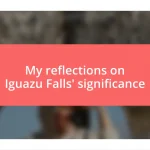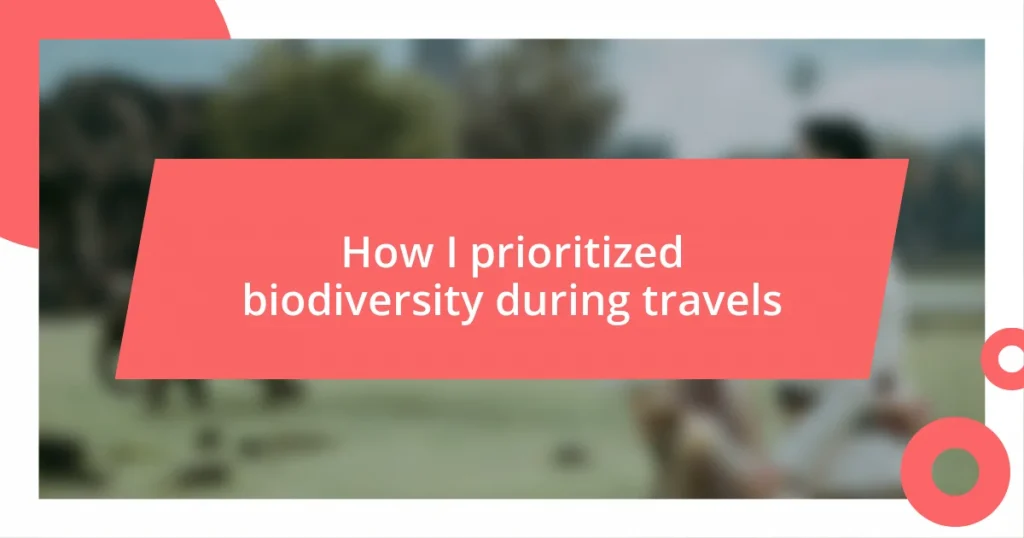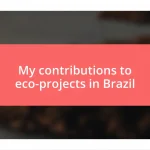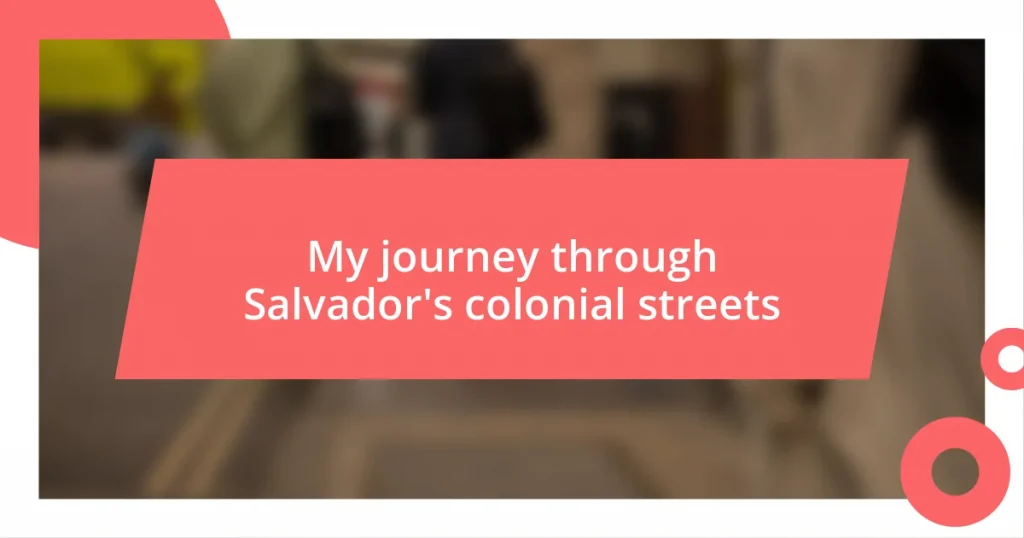Key takeaways:
- Understanding the interconnectedness of ecosystems during travels fosters a sense of responsibility to protect biodiversity.
- Researching eco-friendly destinations and choosing sustainable accommodations enhances travel experiences while supporting conservation efforts.
- Engaging with local conservation initiatives and reflecting on personal travel impact encourages travelers to make mindful choices that benefit the environment.
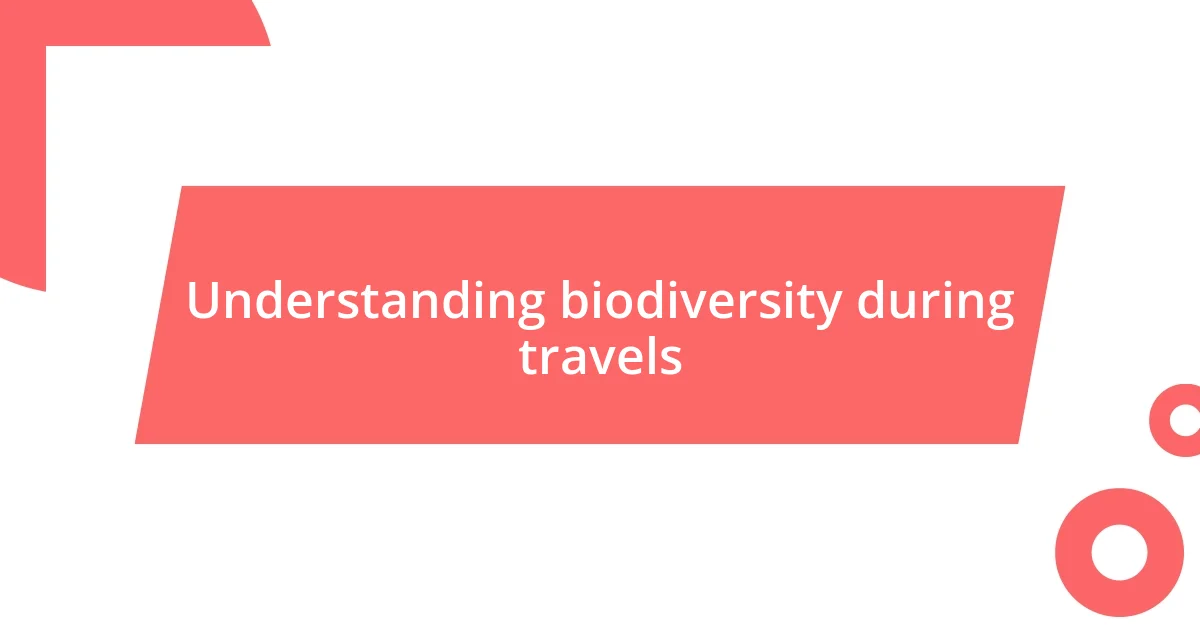
Understanding biodiversity during travels
Understanding biodiversity while traveling is not just about observing different species; it’s about immersing yourself in the intricate web of life that sustains those species. I remember standing in the Amazon rainforest, feeling overwhelmed by the sheer diversity of plants and animals. Have you ever experienced that moment when the realization sinks in that every creature and plant plays a role in a delicate balance? It’s humbling.
As I journeyed through the coral reefs in Australia, I was struck by how interconnected everything is. One small action, like touching the coral or using certain sunscreens, can disrupt an entire ecosystem. This awareness transformed my travel approach from mere sightseeing to a deep responsibility for the places I visited. How often do we consider the impact of our actions while exploring the beauty around us?
Traveling with biodiversity in mind opens your eyes to the complex relationships in nature. Each location tells a story that reflects its unique ecosystem. Once, in Madagascar, I found myself amazed by the lemurs—their playful antics were mesmerizing, but I also felt a pang of sadness as I learned about their endangered status. Isn’t it powerful to think that our adventures can contribute to preservation, as long as we choose to respect and protect what we encounter along the way?
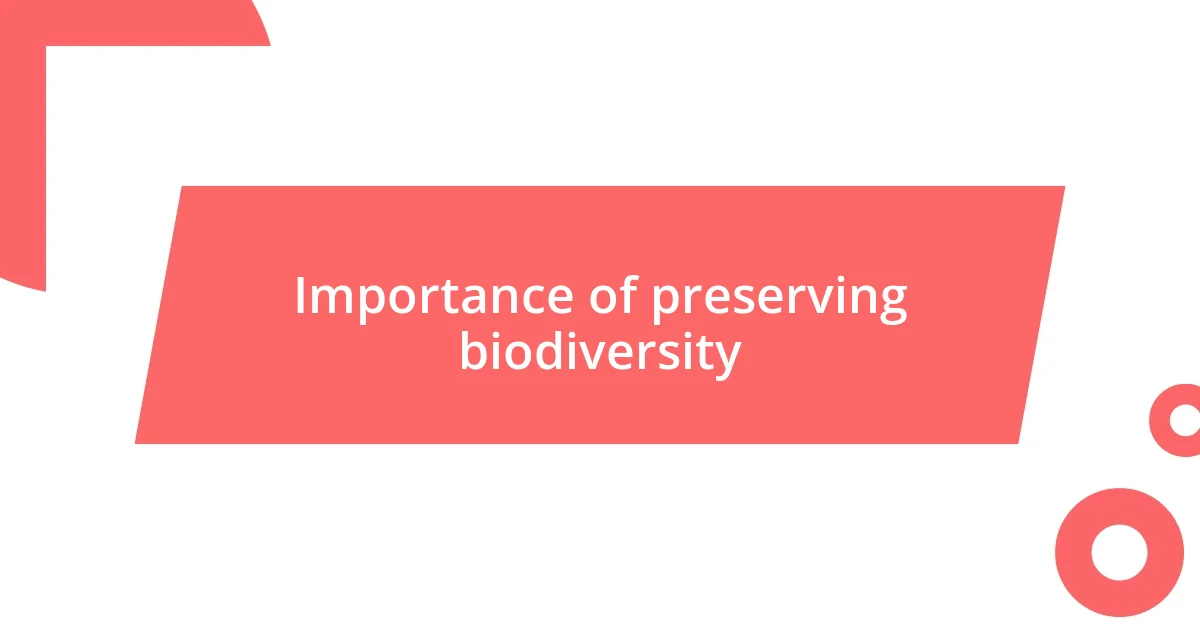
Importance of preserving biodiversity
Preserving biodiversity is crucial because it supports the health of ecosystems, which in turn sustains human life. During my travels, I’ve often reflecting on how diverse species contribute to clean air, fresh water, and fertile soil. I remember snorkeling in Belize, where the vibrant marine life not only captivated me but also made me realize that the healthy coral reefs were vital for the livelihoods of local communities. Understanding this interconnectedness deepened my appreciation for the natural world.
- Biodiversity enhances ecosystem resilience, allowing them to recover from environmental changes.
- It provides humans with resources, including food, medicine, and materials.
- Maintaining diverse habitats supports tourism and local economies while fostering cultural heritage.
- The loss of biodiversity can lead to devastating consequences for climate stability and global food security.
Each time I engage with a new environment, I feel the weight of responsibility to protect it. For example, hiking through the lush forests of Costa Rica, I couldn’t help but notice the rare birds flitting about. I learned that their survival was threatened by deforestation. This realization ignited a sense of urgency in me: our global biodiversity isn’t just a charming concept; it’s a fundamental pillar of life on Earth that we must champion.
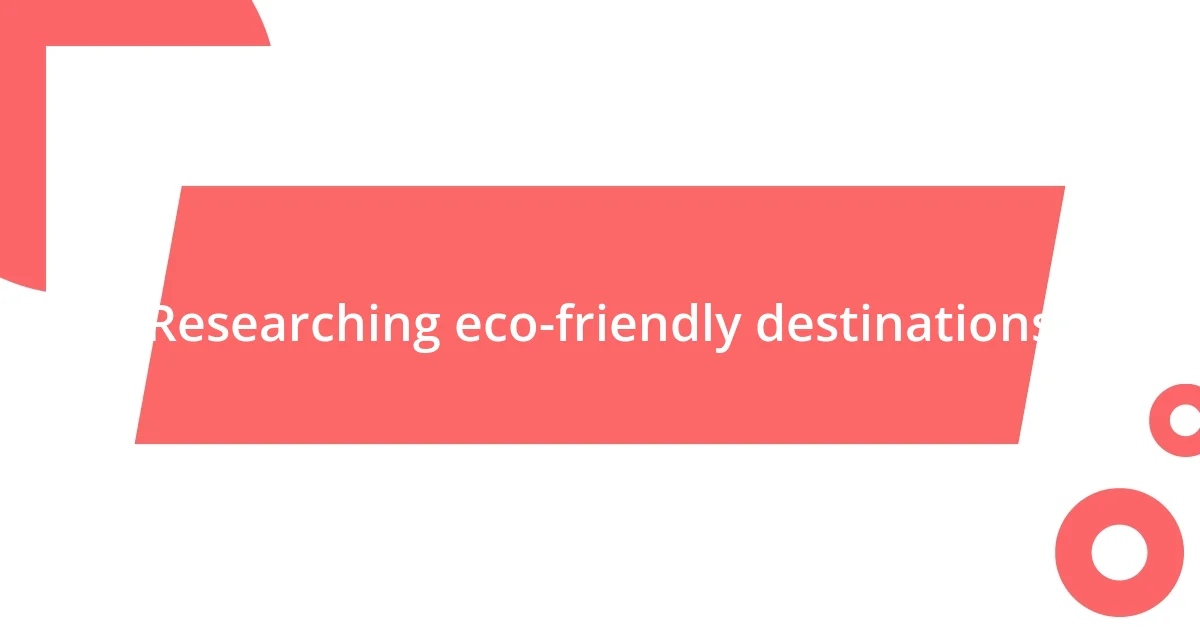
Researching eco-friendly destinations
Researching eco-friendly destinations has become a key aspect of my travel planning. I remember sitting at my kitchen table, sifting through countless online resources, trying to identify places that value sustainability and nature conservation. It was exciting to find eco-lodges in Costa Rica that not only offer stunning views but also actively contribute to their environment through local community programs. Have you ever discovered a destination that felt more like a purpose-driven venture?
In my search, I noticed how some destinations promote biodiversity as part of their allure, appealing to eco-conscious travelers like me. For instance, while exploring options for Peru, I stumbled upon the Colca Canyon, where local guides highlight the unique flora and fauna. This experience was not just an adventure; it felt like I was joining a community that genuinely cares about preserving its natural treasures. Isn’t it remarkable when travel can intersect with our values?
I also learned the importance of examining a destination’s certifications, such as being a “green” certified property, to ensure ethical practices. Websites like EcoTourism.org offer valuable insights into responsible travel choices. I recall excitedly booking a tour in the Galápagos Islands that promised to minimize impact. This level of research not only enhanced my travel experience but reinforced my commitment to biodiversity. How do you integrate eco-consciousness into your travel plans?
| Destination | Eco-Friendly Initiatives |
|---|---|
| Costa Rica | Community programs, eco-lodges |
| Peru | Guided tours highlighting local flora and fauna |
| Galápagos Islands | Strict regulations on tourism to protect wildlife |
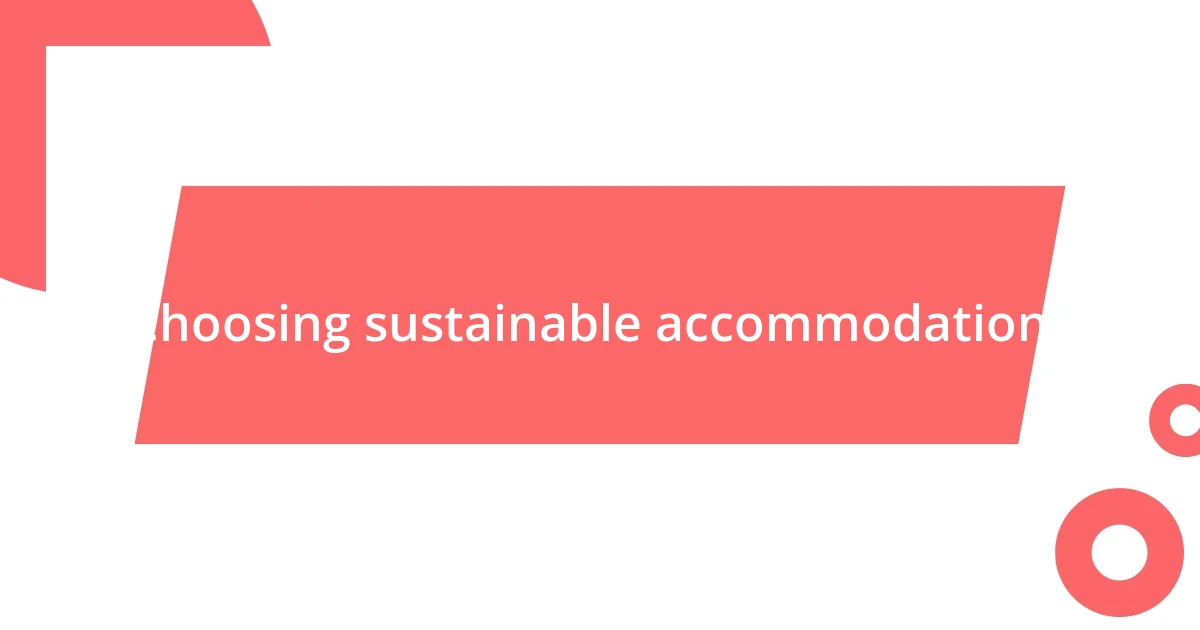
Choosing sustainable accommodations
Opting for sustainable accommodations has transformed my travel experiences in remarkable ways. For instance, during my recent stay in a small eco-lodge in the mountains of Guatemala, I was captivated by how the owners managed the facility with an unwavering commitment to the local environment. They utilized solar panels and practiced rainwater harvesting, making me feel like I was contributing to a cause greater than myself. Have you ever felt that powerful connection with a place?
I’ve often found that choosing eco-friendly accommodations opens up avenues to learn more about the local culture and conservation efforts. During my time at a beachfront resort in Hawaii, I participated in a beach clean-up organized by the hotel. Not only did it deepen my sense of community, but I also met other travelers committed to preserving nature. Isn’t it inspiring to share these moments with like-minded individuals?
I always ensure my lodging practices ethical standards by checking for certifications. Each time I book a place that adheres to sustainable practices, I feel a sense of pride knowing I’m supporting businesses that align with my values. The research may take time, but every choice brings me one step closer to being a responsible traveler, nurturing the very ecosystems that make our world so breathtaking. What steps do you take to ensure your travels are sustainable?
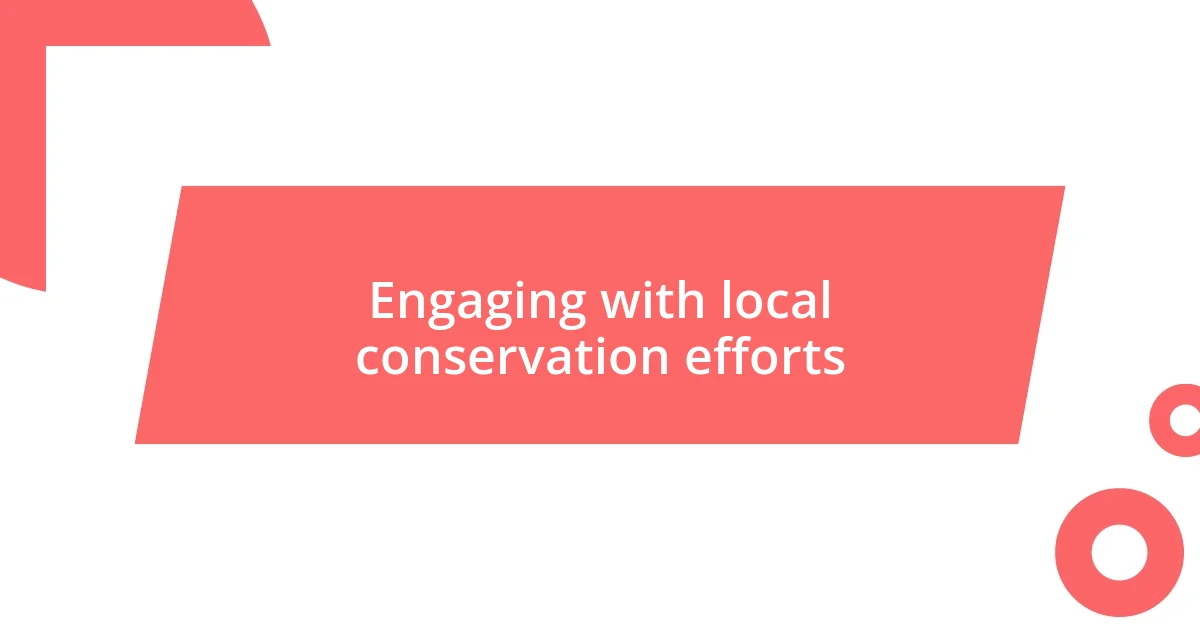
Engaging with local conservation efforts
Engaging with local conservation efforts has truly enriched my travel experiences. I recall a heartwarming day volunteering with a sea turtle rescue organization on the coast of Mexico. As I helped release hatchlings into the ocean, I felt an overwhelming sense of purpose, knowing that my small contribution could make a difference in protecting these incredible creatures. Have you ever felt the joy of giving back while traveling?
One memorable moment for me was participating in a reforestation project in Madagascar. Surrounded by local guides who were passionate about their work, we planted trees that would help restore habitats for endangered species. It was incredible to witness firsthand how community-centered efforts not only protect biodiversity but also strengthen local livelihoods. Isn’t it eye-opening to realize how interconnected we are to the places we visit?
I make it a point to connect with organizations before my trips to see how I can contribute, whether through donations or hands-on help. During a visit to national parks in South Africa, I joined a ranger-led initiative that educated visitors about local wildlife and conservation challenges. This not only deepened my understanding but also fostered a palpable bond with the land and its stewards. How do you find ways to engage with conservation when you travel?
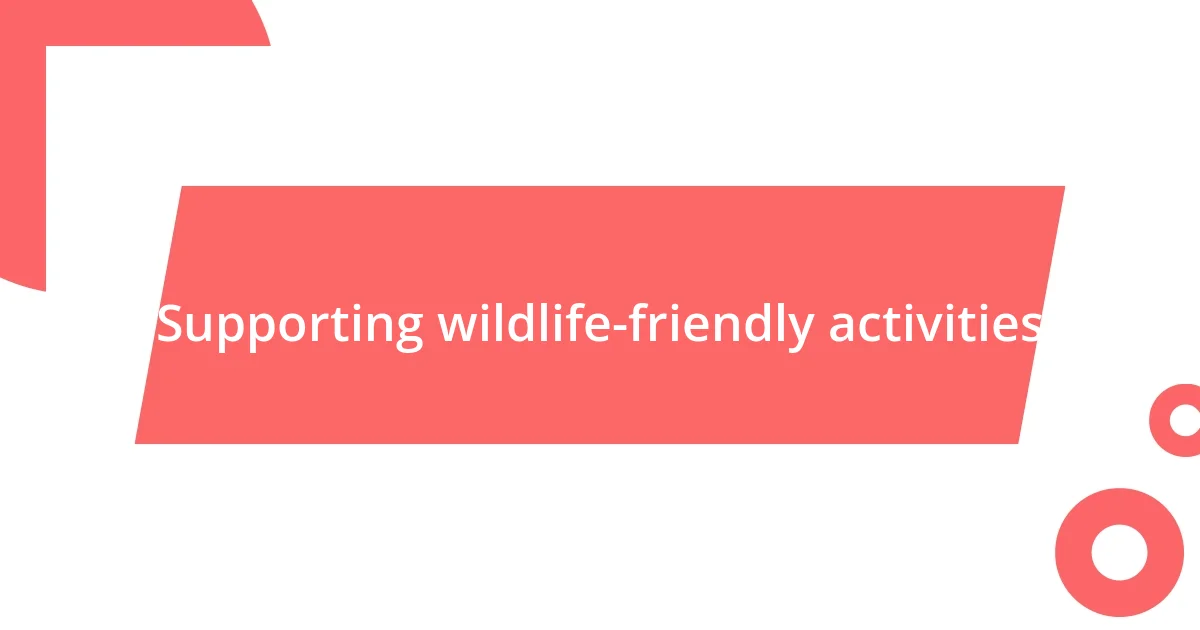
Supporting wildlife-friendly activities
Supporting wildlife-friendly activities has become a vital aspect of my travels. One of my favorite experiences was participating in a guided wildlife watching tour in Costa Rica, where our guide was deeply committed to ethical practices. Instead of disturbing the animals, we observed them from a respectful distance, soaking in the beauty of their natural behaviors. Isn’t it refreshing to witness wildlife thriving without unnecessary interference?
I also make it a habit to seek out tours that give back to local communities or conservation projects. While in the Amazon rainforest, I signed up for a canoe trip led by local indigenous people. They shared their knowledge about the ecosystem and the importance of protecting their ancestral land. It was awe-inspiring to hear them speak about their efforts in reintroducing native species to the area. How often do we get to learn directly from those who have lived harmoniously with nature for generations?
Moreover, I look for opportunities to support local businesses that advocate for wildlife protection. During a visit to a conservation-themed coffee farm in Colombia, I was amazed by how their dedication to sustainable practices was coupled with a mission to protect migratory bird habitats. It felt incredible to sip my coffee, knowing that my purchase directly supported not only biodiversity but also local farmers. Have you ever thought about the impact of your spending on wildlife conservation?
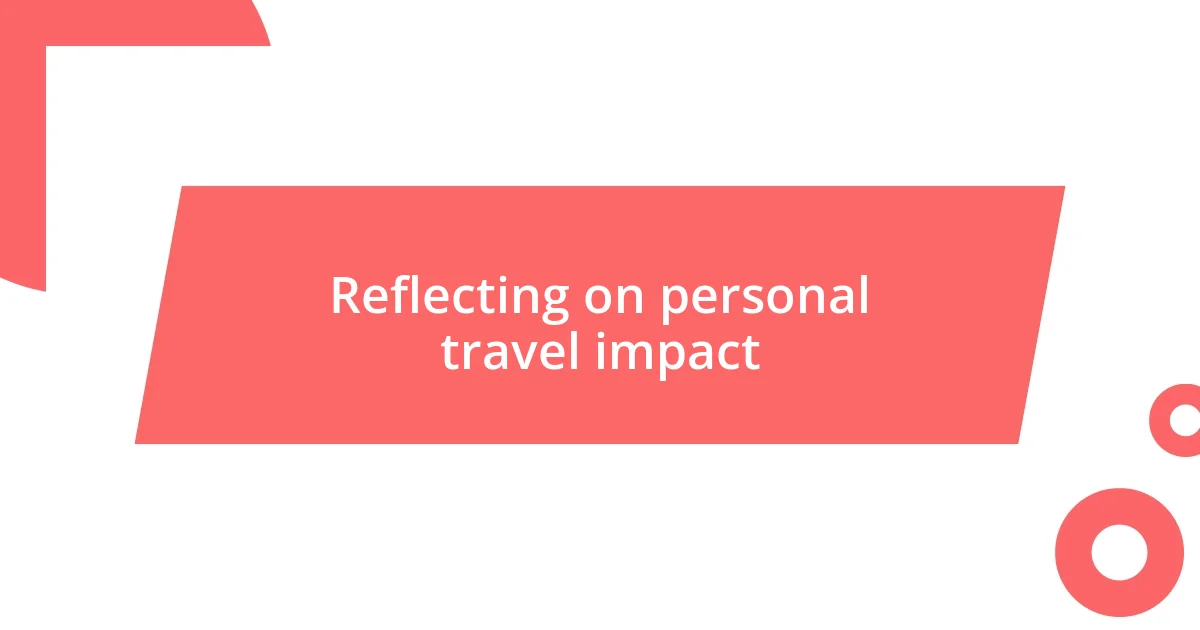
Reflecting on personal travel impact
Reflecting on my travel impact invites me to consider the footprints I leave behind in the places I visit. Recently, while hiking in the lush forests of the Pacific Northwest, I noticed the delicate balance of nature all around me. Observing the various species of plants and animals, I felt a rush of responsibility; every moment spent there seemed to highlight how my choices – such as the trails I walked or the products I bought – could either harm or help the environment. Have you ever paused to think about what your presence means to the ecosystems that welcome you?
I often find myself pondering the concept of minimal impact. During a trip to the Galápagos Islands, I adhered to strict guidelines to preserve the unique wildlife. I vividly recall the feeling of awe when facing a massive tortoise in its natural habitat, knowing that my respect for its space played a part in its ongoing survival. These experiences remind me that engaging thoughtfully while traveling is essential; it’s about leaving places better than we found them. How can we ensure our adventures contribute positively to the ecosystems we explore?
The ripple effects of our travel decisions can be profound. A small choice, like opting for eco-friendly accommodations in Thailand, resonates beyond just my stay. It supports local enterprises committed to sustainability and conservation. Reflecting on these choices allows me to appreciate how interconnected our actions are with the health of the planet. When was the last time you reflected on the broader implications of your travel choices?




